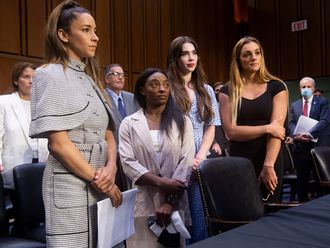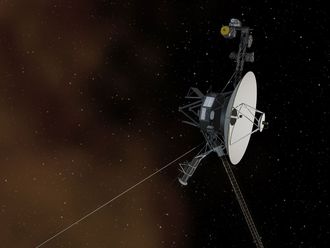Washington: Shortly after receiving a diagnosis of pneumonia on Friday, Hillary Clinton decided to limit the information to her family members and close aides, certain that the illness was not a crucial issue for voters and that it might be twisted and exploited by her opponents, several Clinton advisers and allies said on Monday.
To those she did inform, Clinton was emphatic: She intended to “press on” with her campaign schedule, she said. Her confidants concluded that Clinton did not want to be challenged over her preference to keep the pneumonia secret and continue working.
Clinton’s inner circle was mindful of both her guardedness and her expectation of loyalty once her mind is made up. And she was optimistic that she could recover over the weekend, when she had only two brief events on her schedule, said the advisers and allies, who insisted on anonymity to disclose private conversations.
But Clinton’s penchant for privacy backfired. On Monday, her campaign scrambled to reassure voters about her health, a day after she grew visibly weak and was filmed being helped into a van: unsettling images that circulated widely and led her aides to disclose the pneumonia diagnosis, two days after the fact.
In a phone interview with CNN’s Anderson Cooper on Monday night, Clinton said she had kept her diagnosis a secret because “I just didn’t think it was going to be that big a deal,” and tried to shift the discussion to her Republican opponent, Donald Trump, and his lack of transparency.
“It’s really past time for him to be held to the same standards,” she said.
Clinton’s aides acknowledged that they should have been more forthcoming and said she would release more details about her physical fitness and medical history this week, a concession to the political pressure that she is now under because she chose not to disclose her diagnosis sooner.
But the manner in which Clinton’s illness became public has also revived concerns among supporters, and criticism among detractors, about her seemingly reflexive tendency to hunker down and hoard information, often citing a “zone of privacy,” when she senses a political threat. Her desire for tight control over personal information deepened during the partisan wars of the 1990s, influenced her use of a private email server as secretary of state, and now threatens to make her look, again, as though she has something to hide.
“Usually you would think that the truth sets you free, but in the experiences that Hillary Clinton has lived through, that’s not necessarily accurate,” said Jay Jacobs, a Democratic Party leader in New York and close ally of the Clintons.
Referring to 1990s investigations of the Clintons, he said: “Whether it’s Whitewater or Travelgate or other things, when the facts came out, it still didn’t solve the problem. They did nothing wrong, but there was still controversy. She is a very private person, and she would rather not put out information that she did not feel needed to be shared.”
The new onslaught of questions about her health and medical records has been deeply frustrating to Clinton and her team, who have sought to highlight the disparity between her and Trump over issues of transparency. Clinton has released her tax returns, while Trump has not. She has provided sometimes exhaustive details about her policy proposals, while he has not. And she released considerably more medical information last year — in a letter from her physician, Dr. Lisa R. Bardack — than Trump did in his doctor’s letter, which contained little more than over-the-top boasts about Trump’s “strength and stamina.”
Yet as much as they want the pressure to be on Trump, Clinton and her advisers are now on the defensive.
“She has been totally transparent on the important issues, including public policy ideas, far more than Trump,” said former Rep. Barney Frank of Massachusetts, a longtime ally of Clinton’s. “But there’s also a combination of a natural desire for privacy and the fear that information will be politically misused.”
Clinton has long relied on a tight-knit, intensely loyal group of aides who share her instincts for political warfare and her scepticism and even hostility toward calls for fuller disclosure. Some of these advisers, like Huma Abedin and Cheryl D. Mills, have worked with her since the 1990s, when Clinton complained that a “vast right-wing conspiracy” was targeting her and her husband, President Bill Clinton.
Most voters have not been moved by questions about Clinton’s health: 74 per cent of registered voters said they were unconcerned about her being healthy enough to carry out the job of president, a Fox News poll last month found.
But trustworthiness is a glaring problem for Clinton: Six in 10 voters said they did not trust her, about the same who said they distrusted Trump, according to a Washington Post/ABC News poll released last week.
Clinton had several opportunities before Sunday to disclose that she was battling pneumonia, including at a news conference Friday where she discussed her plans to defeat the Islamic State, called for a rethinking of the Obama administration’s approach to North Korea and ridiculed Trump’s praise for the Russian president, Vladimir V. Putin.












